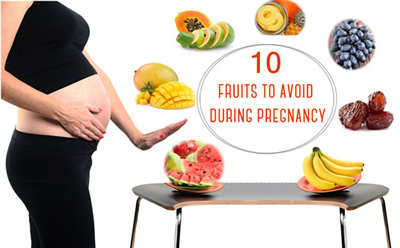
Fruits To Avoid During Pregnancy
Here we’ve compiled a list of fruits to avoid during pregnancy, and why.
1. Papaya:
When we discuss about which fruits to avoid during pregnancy, papaya tops the list. A ripe papaya is a good source of healthy vitamins but an unripe papaya contains the ‘Papain’ in their latex, which may induce involuntary uterine contractions and lead to miscarriage. This is why an unripe papaya must be avoided at all costs. Taken in the earlier stages, it may result in an abortion or cause severe abnormalities in the newborn child. Mothers in their final trimesters are also asked to refrain from eating papaya since it can cause uterine contractions that induce premature labor.
Another problem with papaya is that it can induce a latex allergy; then the expecting mother may also become allergic to other foods that may contain simple latex such as bananas, apples, wheat, etc. It might then get passed on to the fetus, impairing its growth in the initial years. So instead of losing sleep over the ripeness of a papaya, pregnant women are advised to eliminate the risk all together!
2. Pineapple:
Pineapple may be your guilty pleasure during the summers with its beautiful taste and succulent fibrous texture. But it is not a desirable addition in your diet if your trimester falls in summer. The fruit is highly rich in a compound called Bromelian, which is responsible for softening the cervix, often leading to diarrhea. During pregnancy it can however lead to contractions of the involuntary kinds leading to premature labor and deliveries.
One or two slices are okay, if you really must have it, but definitely avoid it during the nascent first trimester. Keep in mind that it has such powerful labor-inducing properties that often doctors prescribe ample bouts of pineapple juice for women whose due date is long past. But do not do this by yourself unless your doctor prescribes it!
3. Black Grapes:
Some physicians and concerned elders advise against the consumption of black grapes. It is also one of the few fruits to avoid during pregnancy especially during the nascent first trimester. The rationale behind it is that it generates a lot of heat in the body, which can be harmful for the unborn baby.
4. Bananas:
Surprisingly the humble banana has also featured in this list. Despite all its various benefits, bananas raise a red flag for the pregnancy diet. Bananas are known to contain chitinase, an enzyme that is a variety of simple latex and also a major allergen if the pregnant mother contracts the latex-fruit syndrome or quite simply the latex allergy as mentioned before in #1.
So it is of utmost importance to check whether the expectant mother has any latex related allergies to avoid any sort of complications that may lead to miscarriage.
5. Watermelons:
Watermelon is a wonder fruit that replenishes our body’s water content and helps increase our calcium levels with the presence of argenine. But there is also a hidden downside to all this goodness.
Watermelon is often used for kidney cleanse during summers. While this is a good thing, it could be harmful for your unborn baby. The main work of a good cleanse is to clean out all the dirt and impurities in the body and flush them out though our intestines. But in a pregnant woman, all her ‘pipes and drains’ are connected to the baby as well!
So if the cleanse is sucking the dirt out of Mom’s body, then it also exposes the fetus to a high level of toxins which can be harmful for the baby. This is why, despite its many health benefits, it is best to avoid watermelons during pregnancy beyond a slice or two in a week. Another good reason to boycott it is because it is also included under “cold-inducing” foods to avoid during the first trimester. Even while breastfeeding, some mothers are advised against consuming watermelons.
6. Sesame Seeds:
In Indian culture, sesame seeds were traditionally used as medicine for causing abortion. The rationale behind it is that sesame activates the uterine muscles and cause involuntary contractions which lead to expelling the fertilized ovum. This is effective in the first trimester so avoid sesame at all costs.
7. Dates:
In the Indian parlance, dates were avoided by expecting mothers as they contain components that excite the uterus muscles as well as generate excessive heat in the body. A couple a day should be okay, if you have a craving, but avoid large helpings and preferably skip these completely.
8. Frozen Berries:
Always consume fresh fruits and avoid frozen ones, especially berries. The rationale is quite simple; the amount of preservatives used and the time over which the fruits are frozen depletes its essential goodness and may be more harmful for the unborn baby. Hence it is of no use to pregnant women.
9. Canned Tomatoes:
Avoiding canned foods, especially tomatoes, is always a good idea, as it will help refrain from various preservative related complications that may be caused. This is why pregnant women are asked to eat more of home-cooked food, and not restaurant fare, as there is no chance of knowing what kind of ingredients have gone into making the latter. If at all used, try those which are BPA-free.
10. Mangoes:
Again, the mangoes is a member of the latex allergy group and one of the fruits to avoid in pregnancy. If you definitely need to taste one, do make it a single piece! Also make sure that the fruit is thoroughly washed off, removing any traces of pesticides or chemicals. This is important to prevent contacting infections from toxmoplasmosis.
We hope by now you are aware of what are the fruits to avoid during pregnancy. It is best to seek advice from your doctor and weigh the pros and cons of consuming each of these fruits during your pregnancy period. Happy pregnancy!
Health Inspirations – Tips – For Healthy Life – Take care of you Body. It is the only place you live
<<<< In pursuit of a Healthy Life ~ Welcome Home >>>>





